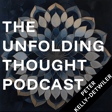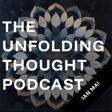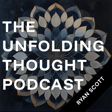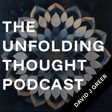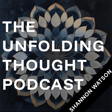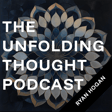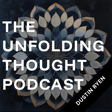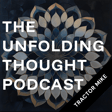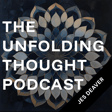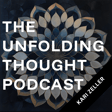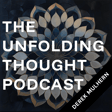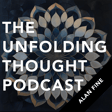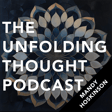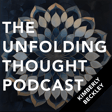Introduction to the Podcast
00:00:05
Speaker
Hi, I'm Eric Bradham. Welcome to the Unfolding Thought Podcast, the show for leaders and deep thinkers who demand more than the usual fluff.
00:00:17
Speaker
If you're the kind of person who moves on from a book, video, or podcast the moment it stops making you think or introducing you to something you can use, I hope you'll feel right at home here.
Podcast Goals and Themes
00:00:31
Speaker
In each episode, we uncover the deeper, often overlooked forces that shape our thoughts and behaviors. So you can see yourself, your team and the world from a whole new angle, and then actually apply what you learn to grow.
00:00:48
Speaker
and do better. On the Unfolding Thought Podcast, we aim for minimal filler and maximal insight, challenging assumptions and sparking new thinking every step of the way.
00:01:02
Speaker
Are you ready to dive deeper? Then let's get started.
Interview with Andy Bales
00:01:07
Speaker
today i'm speaking with my friend and former client andy bales someone that has inspired me and many many others and after having gotten the chance to explore some of andy's background in this conversation i am even more inspired not just by the work andy has done but also by his commitment to help others andy is someone who has dedicated decades to helping people experiencing homelessness find more than just a place to stay
00:01:39
Speaker
From his early days feeding families out of a converted van to leading one of the largest rescue missions in the country and now working primarily with underserved children and families, Andy's journey and words show how much more is needed than simply a meal or a roof over someone's head.
Personal Stories of Homelessness
00:02:01
Speaker
Throughout our conversation, he shares personal stories like his father's own struggles with homelessness and how Andy almost missed his moment of truth when confronted by a hungry man at his parking ramp job.
00:02:15
Speaker
If you've ever heard the debate around Housing First and other programs focused on those experiencing homelessness, addiction, poverty, and numerous other related issues, Andy has been right in the middle of that debate for decades at both the national level and in one of the most prominent and visible locations for those topics in the country.
00:02:41
Speaker
Los Angeles' Skid Row. And now, I bring you Andy Bales.
00:02:48
Speaker
Andy, thank you for joining me. Would you please tell me a little bit about your background? Hi, Eric. Yeah, i grew up in Des Moines, Iowa. Previously, my parents had been struggling in poverty. My mom grew up on the southeast bottoms right next to the river where often it flooded.
00:03:08
Speaker
And her dad actually built their house by hand. And my dad grew up in and around the southeast bottoms and his family was very unstable they would often move and sometimes even move by freight train from des moines iowa to california and my dad told me stories of hanging onto his dad's neck is his dad hopped a train and one time his dad said carl will you quit choking me and my dad said i
00:03:44
Speaker
I don't know what else to hang on to. So my dad was homeless between probably ages 4 to
Career Transformation
00:03:50
Speaker
17. But he spent a week at camp, came home, parents were gone, stayed with a friend, and kind of experienced ah a week of normalcy.
00:04:01
Speaker
And I thought, well, that's what I want my life to be like when I grow up. None of this craziness that's in my own home. And he met my mom at a dance at a roadside settlement.
00:04:13
Speaker
And he joined the war. My parents got married. um He joined the army. My parents got married. He went in the 82nd Airborne. My brother was born with the 82nd Airborne in Fort Bragg.
00:04:28
Speaker
And i am the final of the kids in my family, the third son. and while I was in my mom's womb, she walked the church aisle to to turn her life over to God with my dad.
00:04:43
Speaker
And they... dedicated my life to god and i think that made a big difference in my life they had they had got rid of any of that not all of it but a lot of the leftover hurts of their childhood and made a great life for me spoiled me sent me to school ah love me and i was probably the first person in my family to go to college and graduate from college because of my parents' hard work. The more and more I think about it, the more and more I realize how rough that must have been because I became a diabetic at 13, which changed my life a little bit.
00:05:28
Speaker
And the doctor told my mom that I'd probably only live 25 more years and with a tear in his eye, tears in my mom's eyes. But that All of that caused me to have a heart for the underdog and a heart for people struggling with homelessness because of my dad.
00:05:48
Speaker
But not enough heart because I ah went away to school to be a preacher like Billy Graham. and Went to Biola University, Biola College back in those days.
00:06:00
Speaker
Thought I would be become the next Billy Graham, but I stood up in speech class to give a speech. And I don't know if it was blood sugar low or low or nerves, but I passed out against the chalkboard. and decided I wouldn't be the next Billy Graham. But I hung around young people in college and helped with a youth group and became a youth pastor.
00:06:21
Speaker
had a great time as a youth pastor, a lot of fun, worked too much, hung out with kids too much. became a school teacher, taught for two years, but after the first few weeks of school, I realized why teachers get summers off. So it's not that the kids can be out of school and get a break. It's for teachers to recover.
00:06:40
Speaker
And after two years, I didn't really feel like I'd found my place, probably 25, 26. And I'd done a lot of things and and enjoyed, but I didn't feel like I found my niche. And Somehow, someway, I saw but kids picking on each other, and they were picking in particular on one little girl who didn't dress quite as nice, didn't didn't do well in school, and they were calling her names that...
00:07:12
Speaker
You'd only remember back in the 80s, nerd, dweeb, loser, things like that. And something sparked in me. I just said, do not treat somebody in my class like that.
00:07:23
Speaker
And i thought about it. I went home. I studied the Bible. What could I say to the kids to change their attitude, to make them realize that, you know, a person who feels like a loser in this tough world, if they can't find love in this school,
00:07:40
Speaker
Where are they going to find it? And so I searched the Bible and I found the scripture that says the way you treat another human being is the way that you're treating God himself.
00:07:51
Speaker
And if you give food to a hungry person, it's like giving food to God himself. And if you... give drink to somebody who's thirsty. It's like giving ah drink to God himself. And if you turn your back on a person, it's like turning your back on God himself. So I showed up the next day ready with a sermon. It was private school. I shut the door and I told the kids that the way you treat another human being is the way that you're treating God, I believe.
00:08:16
Speaker
Theologians have said I stretched it, but I said if you're if you hurt the feelings of an already hurting person, it's like hurting God himself.
Commitment to Helping the Homeless
00:08:26
Speaker
And I gave it to him. I gave him the whole thing. I thought was best sermon I'd ever heard, and I should have taken taking notes on myself. I told Tony Campolo.
00:08:35
Speaker
I stole that from Tony Campolo. But I told my wife was the best sermon I'd ever heard, and I preached it. And I was pretty confident. But Friday of that week, left the kids.
00:08:47
Speaker
And on Sunday, I was working at the downtown pack parking ramp because i that's what I did to support my family was teach school during the week, work at the parking ramp many hours on the weekend.
00:09:02
Speaker
And it's like a seven-floor parking ramp downtown, 4th and Grand in Des Moines, where I am now, Des Moines, Iowa, CFM.org. It's children and family urban.
00:09:16
Speaker
Movement is the name of the organization I'm now working with. But I have a history of working with people in missions in both Des Moines and Los Angeles and Pasadena. But anyway, I was down in that parking ramp right after thinking I'd preach this great sermon that changed the hearts of ah the students.
00:09:37
Speaker
But the thing is, I preached that sermon six times. So I heard this message six times. The kids heard it once. I should have recognized the opportunity, but I didn't.
00:09:50
Speaker
i was I was the guy sitting behind the booth taking tickets and the money, not working very hard, watching NFL football on the mini screen. And I was getting ready to ah eat a sandwich.
00:10:04
Speaker
And this guy... knocked on the window, and I looked up, and he was missing his teeth, and had a long, dirty beard, and a long, dirty coat, a bag of soda pop cans slung over his shoulder, and I could tell he was he was homeless.
00:10:20
Speaker
He said, sir, can I have your sandwich? And of course, after preaching the message six times, I said, I'm sorry, sir, but I need my sandwich. And his father face was filled with disappointment.
00:10:34
Speaker
He turned around and walked out into the cold and dark, into the snow. it wasn't immediate, but it was almost immediate that it hit me. Andy, you've preached this six times on Friday, and on Sunday, you missed your opportunity.
00:10:51
Speaker
So I hoped and prayed for another chance, and I asked him, If he wanted to go to supper, and I next saw him and fed him supper. And then i was just, I didn't tell anybody this story because I was completely embarrassed about my failure.
00:11:08
Speaker
But I was walking down the church hall and the missions pastor came up to me and said, Andy, there's a job down at the mission at Door of Faith Mission. I think you should go apply as associate director. And even still, I i left to go downtown and thought, wow, nobody's ever going to hear from me again.
00:11:29
Speaker
And i was a little nervous because my dad used to take me to missions when I was ah younger.
Innovative Homelessness Solutions
00:11:35
Speaker
He would preach and I would sing and the guys might fall out of their chair during chapel and I'd wonder,
00:11:41
Speaker
Is that because of my singing or are they drinking or what's going on? we We'd stop and afterwards we'd have a stale piece of bread and watery bowl of soup.
00:11:53
Speaker
That's what I had in my mind as I went to apply. But when I walked into the door faith, the place was clean. food was really good. The guys were clean and sober. And I saw it as a chance to practice what I preached. and and And more than that, I guess, and it was a process, but more than that, my heart transformed because I used to look through people who are experiencing homelessness and not even feel their pain. like It was like they were invisible. I see somebody eating out of a dumpster and I and just wouldn't let my heart consider them or feel their pain.
00:12:31
Speaker
And I changed to someone who honestly is haunted by the thought of one human being being without a home even tonight here in Des Moines when it's going to be so cold, half inch of snow, five inches of snow on Wednesday.
00:12:49
Speaker
And i you know, I'm haunted by the fact that people are going to be shivering and and perhaps even dying of hypothermia under a bridge tonight in Des Moines, Iowa, and everywhere. But imagine I spent 25 years in L.A., the capital of homelessness, and imagine what it was like to work on Skid Row in Los Angeles with 50,000 people who are homeless on the streets and 70,000 to 75,000 total people who are who are homeless.
00:13:25
Speaker
it's It was really tough on my heart, still tough on my heart, to think about people who are devastated by homelessness. Thank you, Andy. You... So you ended up going to, I think it was Door of Faith.
00:13:39
Speaker
Is that correct? Yeah, Door of Faith was my first stop in Des Moines, Iowa. I worked there probably about four years. And then I transitioned because a group of pastors came to me and said, and we want to do something with you.
00:13:54
Speaker
A group of pastors been praying together for for months. We connected and... I was going out. When I went out on Saturday nights to feed people who were on the streets and who were homeless, I'd feed up to a thousand people out of a van with volunteers helping.
00:14:12
Speaker
And I started it on my motorcycle with sandwiches and hot chocolate, but my mentor told me, hey, let's do this first class. Let's let make barbecued chicken and baked beans and full dinner and take that out on the streets and do it in a van. So I converted my van and we would go out on the streets every Saturday night, go into abandoned buildings and find people. And and our board said, you know, don't do that. It's dangerous and
00:14:43
Speaker
And they've made a choice. And I said, well, if somebody's made a choice to live on the streets, it's because they haven't seen any other choice. I think if we offer them some light at the end of the tunnel, they'll make a different choice.
00:14:57
Speaker
And we were proven true. We'd show up in a abandoned house, feed the guys, and five guys would move in with us that night to the mission. Then I started finding families, like with kids living in abandoned buildings,
00:15:12
Speaker
And I didn't have a solution. would take them to hotels, but I got in hot water with the board of directors because I think one year I spent $48,000 on hotels and it wasn't a fix.
00:15:25
Speaker
but It's like what folks are doing today. you can't solve homelessness with just a roof. over somebody's health. Ahead, you can you can address it for the night, but you can't address it for the long time. It's not sustainable. So the pastors and I and and we launched transitional housing for families with children. And i began with them part-time while my dad took over running the Door Faith mission. I was three-quarter time at Door of Faith mission and one-quarter time launching Good Samaritan Urban Ministries. And
00:16:03
Speaker
The six churches praying together became, make a long story short, they became 120 church coalition, 156 total units of housing, including 20 transitional housing, where we surrounded people with services and the people advanced from transitional housing to permanent supportive housing long before a permanent supportive housing was known or talked about.
Impact and Recognition in Community Work
00:16:29
Speaker
and then into houses for rent, and then even a kind of hybrid habitat home ownership program. We had after-school programs. We had summer camp, and it was it was great.
00:16:42
Speaker
Everything was good. Everything was comfortable doing good work, but I guess I'm never comfortable when I'm comfortable. So the church reached out to me in l a and said,
00:16:55
Speaker
We need somebody to come teach us how to reach out to people who are struggling with poverty and we're surrounded by poverty. Could you come and and help teach us about this? So i went to Pasadena full of hope of changing things.
00:17:14
Speaker
and And was named Neighbor of the Year in Des Moines by Des Moines Register back in those days. Met the president at the 930th point of light. Was kind of a hero back in the day in Des Moines.
00:17:29
Speaker
And those few years in Pasadena, I was that was kind of like public enemy number one for sticking up for people devastated by homelessness. i once made the front page of the paper saying,
00:17:44
Speaker
You know, Des Moines has 1,300 people who are homeless. they' We have 1,300 beds. But in Pasadena, with 1,300 people who are homeless, and we only have 54 beds. So Des Moines does a better job than Pasadena. And that got me in hot water. And then the city wanted me to stop.
00:18:01
Speaker
feeding coffee and and can't even remember the name of it now, but Mexican bread and coffee to the hey day laborers who had waited out there for a job for 30 years long before i ever showed up or we ever showed up.
00:18:18
Speaker
They tried to find me. They tried to threaten me with jail. And finally, the city attorney called and said, you're not going to jail. You're not doing anything wrong.
00:18:29
Speaker
Just keep doing what you're doing. But it caused some controversy. And I i ran for city council against one of the city councilmen that was picking on the church.
00:18:42
Speaker
And I did it to make a statement. But at the board of directors told me that I could either be the executive director of the foundation or and associate pastor, or I could run for city council, but I couldn't do both. And I said, well, i I'm still trying to teach you to how to care about people in poverty, so I'm going i'm going to keep running.
Leadership at Union Rescue Mission
00:19:07
Speaker
They put me on a paid leave of absence, which was nice, the paid leave of absence part, but not the
00:19:14
Speaker
not the leave of absence part, I volunteered and continued doing what I had been doing as a volunteer, but they just stripped me of the executive director over the, I guess part of it was I embarrassed the board chair at his country club because he says, what kind of wacko do you have running your foundation, saying the things that he's saying, sticking up for day labors. And to be honest with you, the thing that stands out to me, it broke my heart and I ate my tears for about three days when, when I i knew ah probably had pushed it and messed up and,
00:19:51
Speaker
And now I was sitting at home crying, but I i was meeting with a day laborer and he said, you know, when I'm standing out there waiting for a job, I feel like dirt.
00:20:02
Speaker
And I told him, you know, I'm kind of thankful because I understand now for the first time in my life, when I got hammered for sticking up for people, i felt like dirt and it was good for me. So I think the church wanted to corral my passion I mean, some people said I was mentally ill and my passion for the poor. And I just agreed and said, i'll I'll take that. I'll accept that title.
00:20:31
Speaker
But some some of my friends said, you know, you need to you need to keep going and and go even more. But my wife told me, Andy, you need to do something different. Don't go back.
00:20:45
Speaker
They offered me to come back in a different way, boss of nobody, and don't don't speak up for justice. And I decided i wouldn't go back. But somehow, some some way, even though I blew it and cried in only recovered. Somehow, the chairman of the board, David Dow, who just passed away, rest in peace, he was interested in hiring me as the next president and CEO of Union Rescue Mission, the biggest rescue mission in the country.
00:21:17
Speaker
I went through a few interviews and The day they put me on the leave, I actually had an interview with Union Rescue Mission. I guess the day that I was kind of let go from the church.
00:21:30
Speaker
I borrowed a suit and went to the went to the meeting in the interview, went through all these questions with several men. They came down to the last question and they said, do you really have ah passion for people who are poor?
00:21:44
Speaker
And I said, okay, okay. I'm just going to tell you, I got put on a leave of absence today for standing up against the pressure from the city to not care about the immigrants, not to feed and and share coffee with the day laborers and for running for city council against the city councilman who was pressuring the church.
00:22:14
Speaker
And I left that interview thinking, well, I blew that one. I'm not going there. went home and told my wife, I'm probably not going there. i didn't hear anything for a while.
00:22:26
Speaker
And then Union Rescue Mission hired me, gave me the greatest opportunity that I've ever had. Chairman of the board, David Dow, pulled up my front yard, came and told me they were hiring me, gave me a contract at double the pay I'd ever made in my life. And I just said, I looked out of my bushes and said, God, you you're just too good to me.
00:22:49
Speaker
i I don't deserve this. I kind of joked. I said, I've worked my whole life to end up on Skid Row. And I finally made it. And so I was there for almost 20 years, hopefully made a ah big difference. And there's some videos that are pretty powerful about What all transpired, we we doubled and tripled the size of Union Rescue Mission, made it the largest rescue mission that in the country.
00:23:15
Speaker
I think I was probably the highest paid leader of our mission, even though that wasn't what was important to me when I when i left. Created not only ah large crowd at Union Rescue Mission, who received tremendous help, but we launched the Satellite and Hope Gardens Family Center in the valley, 23 miles from Union Rescue Mission for moms and kids.
Transition to Des Moines
00:23:39
Speaker
Beautiful place, one the most beautiful places on the earth. So much safety and peace out there. When we launched Angel's House in South LA, we raised $54 million before I left to build run the Angel's House for families.
00:23:58
Speaker
We helped stop or slow down severely hospital dumping of patients. And also we taught LA how to regionalize services. Instead of putting everybody corralling and containing them on Skid Row, we broke the barrier of providing services outside of Skid Row, which is and not easy to do, but we helped make that happen.
00:24:23
Speaker
Then my wife told me, Andy, when you turn 65, I'm returning Des Moines, Iowa, and our redheaded grand girls, and you can join me if you'd like.
00:24:34
Speaker
And i I gulped, and I had to give notice, and I had to leave L.A., which I didn't want to do, and come to Des Moines, Iowa, which my wife retired. I wasn't ready to retire, and I reached out.
00:24:51
Speaker
Found a job through a friend at children and family urban movement, cfam.org. now I work with 150 kids before and after school and their parents have summer camps.
00:25:05
Speaker
And spring break, we have a camp. I didn't really adjust until a couple of months ago I was in the playground. And I'm kind of a grandpa to them and my own grandkids.
00:25:19
Speaker
And a little African girl came up and hugged me around my neck. And I thought, you know, I've been reluctant to accept it all, but i I'm in the right place. I get to love kids every day and be a loving grandpa and give them hope and feed them in the morning, feed them in the afternoon.
00:25:36
Speaker
And just hang out with him and let them know that they're highly valued and loved. Thank you, Andy. You know, I suppose I should share for anyone that's listening.
00:25:49
Speaker
Andy and I have known each other for probably around 15 years off and off and on We've worked together. I've visited Union Rescue Mission on Skid Row several times and worked with Andy's team that he had there.
00:26:06
Speaker
And, you know, you've really had ah big impact as I've seen it. within the broader space, not just of missions and working with people that are dealing with addiction or poverty or any number of related issues, but also quite a number of people that work in the space to help those people to fundraise, to work on those conditions or those circumstances.
Understanding Homelessness
00:26:40
Speaker
you know, I have a decent understanding of Andy's background here for anyone that's listening, but there's even a lot that you shared there that I was not familiar with and really helps me understand how you might feel some of the the desire to be involved with and work on these things.
00:27:04
Speaker
And so I'm curious whether we think about the work that you did anywhere that you have been, whether we think about from the side of someone who is dealing with poverty or homelessness or addiction, or we think about it from the perspective of a donor perhaps or society at large what is it that you have experienced or what have you seen that maybe contributes to someone ending up in poverty or addiction or homelessness i've met thousands and thousands of people devastated by homelessness
00:27:46
Speaker
I've had one tell me I want to be here on the street, but he had a hidden reason. he went through a terrible divorce. In fact, he lived underground in Des Moines. There's a Channel 8 news story about it where they found his underground house and and he he he admitted he was just hiding it.
00:28:08
Speaker
from the world because of heartbreak. But I often have said it's, you know, usually, i think I interviewed 200 people for an Iowa State study and 93% had no connection with family whatsoever. Either they'd burned every bridge with their family or vice versa, or their family disintegrated when they were young, somewhat like my dad's family. My dad, I didn't share I think at 17, my dad got his own place and took his mom in off the streets. That's kind of the devotion he had for his mom, despite everything that he had
00:28:45
Speaker
gone through, but it's a disconnection, disenfranchisement from everyone. That, when you get to that level, that's when you get to Skid Row. You know, most of us have someone who would take them in, right? I mean, a friend, ah family member would help you out for a while, but yeah the disconnection I believe leads to the drowning of your hurt and trauma with alcohol or drugs or whatever way you can find. And the best solution for addiction and recovery is connection.
00:29:27
Speaker
Reconnecting with family, if it's a healthy situation, or reconnection with a new family, a new community. And that was our secret. at Union Rescue Mission, our guys in the program became the family within themselves.
00:29:43
Speaker
we We did all the counseling classes, teaching. They did all the work of working towards their sobriety, but it was the group effort together that brought about the connection and the community.
00:29:56
Speaker
I have a friend, Alan Graham in Austin, who says housing alone won't solve homelessness, but community will. It's, you know, like I said, putting a roof over somebody's house temporarily alone won't solve homelessness, but community will.
00:30:14
Speaker
And who knows? I mean, I've heard stories of a guy going on a ah binge and going home saying, his wife had adopted away his three-year-old.
00:30:26
Speaker
Well, he had a drinking problem in the first place, which caused the wife to give up on him, but he felt in his mind there was no going home. From now on, my life's going to be a fifth of whiskey in the morning and a fifth of whiskey in the middle the day and a fifth to go to bed at night.
00:30:45
Speaker
And you know you hear stories that if I had experienced what they had, I just heard a story ah couple of weeks ago about a guy and I'm not sure I could have handled it. His son is about my son's age.
00:31:00
Speaker
had gone through a divorce, was out cutting trees down on his property, and got his chainsaw stuck in the tree, and he went in to get an axe in his house and come out and cut it down, and a different tree than the one he was working on fell on him and killed him. And this dad now has to live with this loss. I mean, I don't know if I can handle that or if I, at that point,
00:31:27
Speaker
check out. That was the story of my grandpa. He went to World War just called it World War back then. And when he came home, all he wanted to do was drink because he he was traumatized. So unless you put yourself in someone's shoes and totally empathize with them, you can't imagine what they've been been through and going through. And the only thing, my response is not to judge them, but to help them, give them a hand up to resources that will restore them.
Comprehensive Support Strategies
00:32:03
Speaker
And it's not fair to leave somebody in that hurting condition without trying to to help. The Bible says in Proverbs 24, 11, I believe it is, that if you see someone heading toward disaster or slaughter, and you don't intervene, there's a God in heaven that knows your heart and he will judge you in the end. So my philosophy has always been, if someone allows me to intervene, I'll intervene.
00:32:35
Speaker
If they're not ready to get help, then I'll wait till they are. But I feel like I was put on earth to alleviate pain and suffering and especially with kids.
00:32:48
Speaker
And yeah, I know I'm just a softie. I have friends who say I have a mom's heart. My wife and I were driving down the street the other day, and we were hearing about how marriage should be between a man and a woman. She says, we're all messed up.
00:33:02
Speaker
She says, you're more like the woman, and I'm more like the man. I admit that, but maybe my mom gave me that special heart of caring for people like a mom.
00:33:14
Speaker
When we think about helping someone that's dealing with homelessness, and then there tend to be a lot of other things that come along with homelessness before or after.
00:33:25
Speaker
Often someone will deal with whatever the challenge is. Someone loses a job or They, you know, may have issues in their relationship, so they get divorced, and then something else will happen, and then makes it easier or more likely to become addicted to something, and, you know, you kind of get...
00:33:50
Speaker
behind the eight ball or whatever the saying might be and suddenly it's hard to get back to rebuilding relationships and having people be able to feel like they can trust you or they want to help you or whatever else you talked about a few times if I recall correctly that just putting a roof over someone's head is in most cases not going to ultimately solve homelessness because I think if I'm hearing you correctly, there are other things that people need to work on. I think you said surrounding people with these services or surrounding them with a community. You said it very well, yeah.
00:34:39
Speaker
So, yeah, I want to just share that, you know, our guys in our program and our ladies at Hope Gardens, they would deal with the grief and loss that they have in their life, the trauma that they have, especially if they spend any time on the streets. They've probably been, you know, knocked in the head, raped, assaulted in some way, lots of hurt.
00:35:02
Speaker
That doesn't go away necessarily without a lot of building hope and trust and gaining sobriety and being loved in a community and of course getting the roof gaining the skills needed to make it in this world at a higher sometimes a higher pay another way i would say it i if i went into a high school i'd say kids if you want to be without a home when you grow up, drop out of school.
00:35:32
Speaker
Don't go to any kind of special education like HVAC or plumbing or college. Gain an addiction and I'll guarantee you, you'll be visiting me at the mission because in this day and age, you need ah to have a high school diploma.
00:35:52
Speaker
You need special skills, career skills. or college and be free of an addiction to make it in this tough economy. That's kind of a different way of, and get connected with a local community that cares about you.
00:36:10
Speaker
That's the the way that kids can avoid ever experiencing homelessness. I've had my own high school students. I taught at a high school for a year in Miami and a year in Des Moines, and I've had my own high school students show up the front door of the mission needing help four or five years later.
Services for Self-Sufficiency
00:36:31
Speaker
I imagine the needs when you're dealing with children, as I believe I understand you are now, are different from when you're dealing with, let's say, a 35-year-old man in ah mission.
00:36:48
Speaker
But what were the sorts of services that or what were you trying to provide when you were at any mission in order to not just give the person some community or help them rebuild community.
00:37:04
Speaker
But you said, i think one thing that you might help them to get to eventually through training or some other method is, for example, a job or a higher paying job. What are the kinds of services that you try and bring to someone or surround them with so that they can move on from where they're at?
00:37:24
Speaker
Yeah, so started it really at the door of faith where we had a jobs program and the guys had a lot of skills. I used to tell them, hey, we could do anything. We could accomplish anything. We could build a mission together with all of you guys' skills.
00:37:39
Speaker
We just had a jobs program and then the guys paid part of their own way, which ah affirms their dignity. I was able to translate that took me a while, but to a Union Rescue Mission where people actually began paying part of their own way and working because it caused them to have some ownership of their stay made them feel like they are helping with their own rehab by chipping in and having some skin in the game like like everybody did. And I think that helps people turn around by feeling like they're paying their own way.
00:38:18
Speaker
We even got better at it at Union Rescue Mission. We actually had companies come in and teach people how to, interviewing skills. And then to their surprise, ended up hiring a bunch of our staff.
00:38:33
Speaker
Toyota was one. We had a couple of guys from too Toyota create that. position. Now there's more than ah Toyota moved away, but other companies have done the same.
00:38:44
Speaker
Actually, we had PPG, which is an aerospace company, hire some of our ladies from Hope Gardens. They're still at PPG making really good money because of the kindness of fellow named Mark Hood and his team.
00:39:03
Speaker
Well, when I retired, I suggested we, Union Rescue Mission, hire Mark Hood from PPG because he ran a bunch of satellites and he's very smart.
00:39:14
Speaker
I mean, satellites and his different manufacturing companies. He did indeed join Union Rescue Mission as the president and CEO. While he's the CEO, we have ah another fellow, Richard Baker, who was gifted in hospitality that was named the president, and he used to run five-star hotels in China.
00:39:37
Speaker
And so there's a great team of two now who took over for me, but they're now looking at a ah whole ranch that may become a place that focuses on careers for people who've previously been devastated by homelessness. Some of the things we did for kids was have very special Monday nights at the mission.
00:39:57
Speaker
We had people come in. had billionaires come in, people. Even people like Tommy Lasorda came and spoke to our kids. And I think we had four total billionaires every night at Union Rescue Mission.
00:40:11
Speaker
Somebody comes in and speaks on a Monday to lift the spirits of the kids and lift their dreams. You know, always used to shoot for the moon and shoot for the stars and end up on the moon.
00:40:24
Speaker
We also have another youth program, I guess, worthy of love. They come and celebrate on the rooftop every month, all the kids' birthdays that month.
00:40:35
Speaker
I found something strange. When I got to CFM, the 500 kids at Union Rescue Mission were you know or experiencing homelessness, but they seemed less that's traumatized and more happy than the kids here at CFM, who were not homeless, but I didn't know what was going on, whether yeah the neighborhood is...
00:40:59
Speaker
much better than when I was last here working. I worked in this neighborhood for 10 years, 25 years ago, and it's less violent than it was then, but the kids didn't have a lot of whole lot of hope or happiness, and i've I've spent my time to try to make sure that is no longer true, and I would say that You know, reading reading skills are Math skills are up.
00:41:26
Speaker
Referrals, which means getting in trouble at school, are down 50%. I think reading's up 11%. And i think we're making a big difference in the lives of the kids. But mostly, ah we've made a huge difference in loving them and we see it in the way they behave so much better i have so much hope for this year of helping the kids succeed here in des moines and and really what i'm doing is what we're doing is preventing homelessness because we're getting kids to
00:42:00
Speaker
have hope for the future. Also still involved a little bit with homelessness because every night at dinner time, supper time, which is happening behind me, we invite anyone who's hungry in for supper and that's anyone. People are devastated by homelessness, families struggling.
00:42:19
Speaker
Anyone can come in to see if from and have dinner. And a lot of the guys say ah without coming here for dinner and ladies, they'd be very hungry. I know that there's rarely in life with anything that we talk about, there's rarely one place that you can go to, to fix a very complex challenge.
00:42:44
Speaker
But, To help someone who maybe has little direct experience with homelessness, to help them understand where the greatest needs might be today, or even just to develop a greater understanding, a greater sense of compassion, perhaps, for what these folks might deal with.
Mentoring and Community Support
00:43:15
Speaker
And if I was going to donate or if I was going to go volunteer, where might I look to have the greatest impact?
00:43:25
Speaker
Are there places that you are particularly motivated? Where do you see the greatest needs? Yeah, the greatest need, even with the jobs program, we had a mentorship program at Union Rescue Mission, and it was each guy kind of got partnered I won't say sponsored us. They partnered with a caring friend.
00:43:50
Speaker
More than mentorship, it was just having someone in our men's group have someone outside of the mission to walk alongside them, not give them money, not sponsor them, but just be a new connection. ah I'll never forget one guy who his church called me and They said, we got a guy on the corner and he's drinking and we'd like to get him an apartment and and we'd like to help him get a job. and And I said, well, why don't you bring him here to the men's program and let him complete the recovery program and walk alongside him?
00:44:30
Speaker
And I'll never forget, they brought him in I'll call him Mel. And they brought a load of coffee with him. And they met with him every week while he went through our program.
00:44:40
Speaker
And he got baptized in their church. And it was a bigger celebration for the church than it was for Mel. And then the mentor can continued with him even after he got a job.
00:44:55
Speaker
And it was a it was one of our biggest successes. So it's it's a relationship and a connection that keeps going. And whether that's with a sixth grader or a fourth grader or 35-year-old man, that's the biggest need.
00:45:14
Speaker
And that's the that's the maybe the risky, messy one. And you got to make sure you don't just feed an addiction or get conned or You can't do everything for somebody and you need to go do it without judging a book by its cover because I've seen experiences where somebody just because somebody's attractive, they think, oh, I can pour my life into this guy.
00:45:40
Speaker
and he he will succeed. Well, that may be the guy that takes you for everything you own and gets you in trouble. So you've got to be discerning and wise before you pour your life into someone. And you you can't be someone who feeds their addiction or their ego or their gambling problem.
00:45:59
Speaker
It's not about money. You need to not practice toxic charity where you do everything or pay for everything for somebody, but give them a chance to succeed.
00:46:11
Speaker
There's a quote from, I think it's the German playwright Goethe. So for anyone that's listening to this, that doesn't know, i got my bachelor's and my first master's in German. So I have a little bit more familiarity with German then or or Germans than I might have with other spaces, but I think it was Guta who said something along the lines of too many parents make the lives of their children too hard by trying to make their lives too easy.
00:46:44
Speaker
And I think of that often, not just in terms of parenting, because, you know, my children are young enough that I still have a lot to learn as a parent, but I think about it as ah manager.
00:47:01
Speaker
I think about it in relation to just trying to help people that you rarely know what is too much or when you're, let's say, hobbling someone.
00:47:18
Speaker
And you need to help them come to a place where they can see the benefit of hard work. And so I suspect for a lot of people who may care quite a bit,
00:47:33
Speaker
about whether it's donating or volunteering time or whatever it is. I suspect that a lot of people just don't have enough interactions with those who might be in need to get the feedback that you have gotten to know over time, you know, if I'm you, Andy, perhaps over time, I've seen that there's a certain type of help or a depth of help that actually enables someone or disempowers them such that they stay in their situation.
Challenges and Critiques of Current Models
00:48:06
Speaker
And you, for anyone as well that is listening to this, I recommend that you look Andy up and I'll have information in the show notes by... You were on Skid Row. And, you know, when I was a kid, for what it's worth, we lived out east of L.A. And we also lived in inner city, San Francisco.
00:48:27
Speaker
And my great grandmother, she worked at the Adventist Hospital in Glendale. So we would go to visit her and we would go to Skid row when I was a kid. And so, you know, i I don't have the clearest memories of everything, but because of the type of person that she was and where we came from, i had some familiarity with it. And it has changed in so many ways over the years. You, I'm sure saw, let's say cycles, whether it was in the people who were there or the effects that politics or the economy had on things.
00:49:06
Speaker
But What I'm wondering is, you know, I was reading a book last year and I was surprised and happy to see that you were featured in this book, Andy. And there was a lot in the book that talked about the housing first model, which for anyone that is not familiar with that, I'm You can certainly look it up. I'll link to something in the show notes.
00:49:32
Speaker
But you've been out there working in and around homelessness. You've also been and advocate for support generally, but also I'm going to say certain models. I think you've probably been on...
00:49:47
Speaker
Various news programs, I forget which, whether it's 60 Minutes or who knows what, but national news, right? Because Skid Row is, you might have said the word, if not the epicenter kind of of homelessness.
00:50:00
Speaker
And so what I'm, in my very long preamble, trying to come around to is what is someone who isn't getting the regular feedback they're trying to donate or they do really care But what are some of these things that they might support or they might think should help someone dealing with homelessness that in your experience often maybe there their support is working at counter purposes to getting the person out of homelessness?
00:50:35
Speaker
That really sums up Housing First, I would add, harm reduction model in l LA where they are providing very expensive apartments for a few with no support services like counseling or ah addiction counseling.
00:50:54
Speaker
They just concentrate on the very expensive housing for a few. while they they leave thousands on the streets to suffer and die in the cold.
00:51:05
Speaker
That's their philosophy. I've been a severe critic of meeting somebody where they are and providing a roof over their heads and leaving them where they are to to die of an overdose.
00:51:21
Speaker
think one-third of all overdoses last year In San Francisco, we're in permanent supportive housing. And in l L.A., it's I'm sure it's worse, but it's just a free flow of alcohol and drugs. So I call harm reduction, actually, harm enhancement, because it's a free flow of alcohol and drugs supervised by brutal gangs who, when they collect, they don't mess around. i was pulling out of my our underground parking at Union Rescue Mission,
00:51:53
Speaker
biggest man I'd ever seen. He looked like a nose guard, famous nose guard from Green Bay, 6'6", 400 pounds. And he was beating on a woman and I rolled down my window and said, you need to quit hitting that woman. And he said, she owes us money.
00:52:09
Speaker
Now you get that, right? She owes us money. I said, oh, there's no reason for being on a woman. And he was on my truck within seconds, fastest big dude I've ever seen punching my window.
00:52:23
Speaker
And I called my security and said that, you know, we need help. And they came out and he ran across the street, but he was thinking about coming back. And I looked at our guys and said, I think I need more help.
00:52:34
Speaker
But it ends up that her boyfriend owed the gang money, not her. So they took it out on her. That's reality. That's the reality that public officials...
00:52:46
Speaker
who think that putting a roof, a very expensive roof for a few, makes a difference in homelessness. And that that housing first harm reduction version in L.A. has been an absolute disaster.
00:53:01
Speaker
And it's created the worst man-made disaster in the U.S. And that's called Skid Row. It's created a human rights violation that I can't even imagine. 1,500 people are now living in permanent supportive housing that is not even really being supervised other than a receivership.
00:53:21
Speaker
And the elevators don't work. And the drugs freely flow. And the doors are propped open. There is no safety there. It is an absolute mess.
00:53:33
Speaker
I've worked with the l LA Alliance and Judge Carter and tried to do everything I could. And that's the reason why I regretted so the kind of ultimatum my wife gave me to to leave because i we weren't finished and we by no means solved homelessness on Skid Row.
00:53:53
Speaker
And Skid Row is the most dangerous, according to Forbes magazine, the most dangerous neighborhood in the U.S. and surrounded by the second and third of the top 10 most dangerous neighborhoods in the U.S. And they still need to do whatever it takes to solve Skid Row.
00:54:14
Speaker
And it's going to take a lot. Sounds like what you have advocated for, whether you've said it directly or you've just described the types of programs you've worked on, it sounds like you really recommend that if someone is looking to help or if they're even just, you see something on the news and you're thinking about What impactful, really, going to say, quote unquote, successful support might look like. it sounds like you really advocate for, look for those programs and look for those people where you have more than just a home, a house, a roof, more than just a meal.
00:54:58
Speaker
You need a lot of things. Yeah. Look for places like Change Course in Des Moines. friend of mine, Joe Johnson, started it of helping people become productive and on a career track and making comebacks.
00:55:12
Speaker
Look at Union Rescue Mission and Los Angeles or places that believe in people can recover and make a comeback and return to productivity because people do recover. People do become productive.
00:55:29
Speaker
Some of them are the best employees that we have. at Union Rescue Mission, people who've made a ah comeback and are living a wonderful life now because somebody not only opened the door, but volunteers came and
Role of Volunteers
00:55:43
Speaker
surrounded them with love. i always used to say the the volunteers who come to the mission with a secret recipe of love that made such a huge impact.
00:55:55
Speaker
And I still believe that. ah So find out a place that's, you know, making a difference, helping people recover, helping people become productive, and going back out in the world and being successful, and then go help them.
00:56:10
Speaker
And they need help. they and Everybody needs volunteers to make a difference, including CF. We have groups that come and volunteer, but we also have people who come and read with our kids.
00:56:22
Speaker
And the single most, I guess, best help for a child to learn to read is having an adult read to them. And so that's what we concentrate at, Children and Family Urban Movement in Des Moines.
00:56:36
Speaker
I suppose we should say that, you know, while your wife had, I'm guessing, a very understandable drive to be near the grandchildren and all of that, though it did, it pulled you away from ah place that you'd done very meaningful work and the ah work is not yet done.
00:56:59
Speaker
Am I recalling correctly that you and your wife donated your home to the mission? Was there something like that? We didn't donate, but we sold under market our our home to Door of Hope in Pasadena, which they're converting it 20 units of transit, not because it was that big of a house, but they're adding to and converting it to 20 units of transitional housing for two parent families and one parent families in Pasadena area.
00:57:33
Speaker
It's so strange because i think the fires came within a few blocks of our house recently and it was spared, but also the leader, Megan Katirjian, her home was lost during the fires and really my heart is with them.
00:57:52
Speaker
amazingly, they've raised the money that they've needed to convert it. And i guess they, I think they named the front porch after me because that's where I spent most of my time when my wife was, was redecorating and painting and things. And I just would hang on the front porch. I love that front porch. And I would say I've had a tough adjustment missing that porch and lost, struggled with the loss of identity of being the director of the mission at and Union Rescue Mission thought I was going to
Fulfillment in Preventive Work
00:58:24
Speaker
there. but But like I said, just a few months ago when little girl gave me a big hug on the playground, I thought, I'm going to be all right. I love being grandpa to 150 kids.
00:58:36
Speaker
That's to me really beautiful. And if you can, forget how you said it, but if you can help provide these children with at least some of the things that they need to avoid homelessness or to avoid a worse outcome, then you create positive impacts in so many ways, not just for that individual, but for the people that they touch and for the economy.
00:59:07
Speaker
And, you know, you talked about your faith, especially earlier on in the conversation, their considerations there for the kind of impact that your work can have on one child.
00:59:22
Speaker
that can then reverberate through so many different areas. So yeah, I can imagine that going from the weather, the people, the economy, the scale of the work, the types of challenges that you dealt with in the Los Angeles area to Des Moines, Iowa, that's a big change.
00:59:43
Speaker
Thankfully, you get the benefit of being around a little bit of your family and then, you know, Seeing your work will live and have an impact through the lives of those children.
00:59:55
Speaker
That's beautiful.
Closing Thoughts and Farewell
00:59:56
Speaker
Thanks, Eric. Thank you, Andy. And, you know, Andy mentioned he has dinner going on behind him. So, you know, anybody listening to this may have heard that. It's actually Nice, it from my perspective, when you go to ah mission or other places where the work actually occurs, if you're a donor or a volunteer, you get at least a little bit of a sense of the kind of work, the kind of impact, the community.
01:00:30
Speaker
So even though someone listening this may have only heard a little bit, you know, that's a place that's alive with actual the work, as I put it. So Andy, I suppose I won't keep you any longer. I really appreciate you being here. i will have links in the show notes and I recommend that people do look into housing first or anything else so that you can inform yourself about what these things are. There's a lot underneath what we talked about. We had just an hour here and we're talking about decades.
01:01:03
Speaker
of work that has gone and in even in just the modern era around homelessness and poverty so I recommend that everyone check it out but before we go Andy suppose is there anything that you want to tell people or anywhere that you would like to direct them find out where people are making a difference and join them and you may do yourself more good than you do the person who's struggling it may benefit your life the most that's what's happened with me, they I've met some of my best friends and they've been folks that I've watched flourish in their life as well.
01:01:42
Speaker
And I meet people all the time who tell me I was a kid at Sifum once and I just knew it was a church that had food and I was hungry. So I came and now they're working in top posts in Des Moines public schools, you know, others who who've had their lives changed, who are making a difference themselves in our society. So that's what that's what lasts for eternity is change lives, you know, buildings all down or closed or whatever, but change lives last forever.
01:02:19
Speaker
Thank you, Andy. I appreciate that. And I appreciate you joining me here. There's a lot more that we could talk about. And I hope that everyone enjoyed this. so thank you very much. Thank you, Eric.
01:02:32
Speaker
Hey, thank you for listening. I hope you got a lot out of today's conversation. If you enjoyed the episode, please take a moment to rate, review, and subscribe. And please share it with someone you know who'd appreciate this kind of information.
01:02:45
Speaker
Thanks again for listening, and I hope you'll come back for future episodes.


